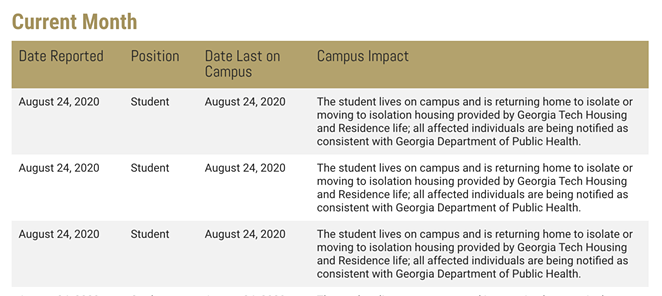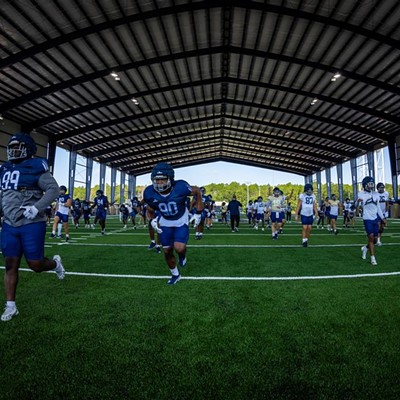THERE’S NO shortage of breaking news in 2020. But the news uppermost on people’s minds right now has to do with the "reopening" of schools at all levels, from K-12 through the universities.
Our local public schools made the difficult but obvious decision to go to a virtual model. It was by no means a given that they’d arrive at this common-sense solution — however many hiccups have been experienced the first week of school — and they deserve kudos for it.
Read more about that in Kristy Edenfield’s story this issue.
At the university level, however, things are much less clear, and often much less common-sense.
And in some cases that seems almost by design.
For example, the University System of Georgia (USG) has no statewide system for tracking and reporting COVID-19 cases on its campuses.
Let me say that again: The University System of Georgia — whose job and role is to govern the state’s 26 public colleges and universities — has no system in place for tracking and reporting COVID-19 cases among students.
When asked, the USG says you have to talk to the individual universities.
And there is no statewide mandate governing reporting at individual universities.
The difference in COVID-19 protocol among Georgia colleges and universities is wildly divergent, laying bare both the inherent weaknesses in the system as well as localized weaknesses in management.
Georgia Tech, unsurprisingly, is leading the way in both protocol and transparency, providing about 1300 free COVID-19 tests to students every day. They post the total number of confirmed cases on their website on a daily basis.
Tech’s attention to detail probably isn’t only due to its expertise as the state’s premier science and research institution. Georgia Tech graduates are highly valuable to the nation’s manufacturing and research infrastructure, to the U.S. Department of Defense, and to the global tech industry. It is in these very powerful entities’ mutual interests to ensure the safety of their future managers and employees.

At least one liberal arts school in the state, however, is taking COVID-19 seriously. While doing nowhere near the amount of testing as Tech, Georgia College & State University is at least providing daily campus infection updates.
Other universities clearly don’t share the same foresight for their graduates.
My alma mater, the University of Georgia, has a student body roughly fifty percent larger than Tech’s, but is doing only about 300 tests per day, with results reported on a weekly basis.
(UGA will, however, host about 23,000 people per home football game this year at Sanford Stadium.)
The state’s largest university by enrollment, Georgia State in Atlanta, says it is currently testing only student athletes and symptomatic students, and not providing regular updates at all. That said, most learning at Georgia State is virtual this semester.
Closer to home, the situation is even more dispiriting.
Georgia Southern University, which has campuses in Savannah and Statesboro open for face-to-face classes, say it plans to introduce weekly case reports shortly, but hasn’t done so as of this writing. The total number of cases at this time remains unreported.
Savannah State University has no announced plan to report cases at all.
(Savannah College of Art and Design, of course, is a private university that isn’t governed by the University System of Georgia. They announced long ago that they’d be almost entirely online-only for this semester.)
All of this increased uncertainty is happening just as Georgia has been identified as the nation’s number-one infection hot spot, with a higher per capita infection rate than even Texas.
It is a near-certainty that the spiraling infection rate on Georgia’s college campuses will act to maintain our dubious number-one national ranking.
The culprit for the most part doesn’t seem to be in-class learning per se, but in social activity off-campus.
Despite Georgia Tech’s safeguards, a cluster of infections at Greek housing is causing great concerns as I write this.
“We have isolated the residents of the houses with the most cases and tested almost all Greek house residents on Saturday using mobile surveillance testing units. Increased testing will continue today and throughout the week at Greek housing and on-campus housing,” a Tech spokesperson says about the new clusters.
Over in Athens, frats and sororities at UGA are going full steam ahead with Rush Weeks almost as usual, with cursory nods to mask protocol.
Lawn parties at UGA frats have already been an ongoing issue since well before actual classes opened for face-to-face learning, going back to when spring classes were canceled.
Several leading health/public safety faculty members at UGA took the remarkable step of publishing an op-ed, under their own names, in the Atlanta Journal-Constitution.
“We are in grave danger that is made doubly acute because we are operating blindly,” they write.
“Rather than testing more than 6,000 students, faculty, and staff per day as is needed to manage a COVID outbreak, rather than provide testing data daily so we can actively surveille and anticipate the need to pivot, rather than operating our own contact tracing program to manage outbreaks, our leaders have adopted a regime of secrecy that serves to bury our collective heads in the sand,” the faculty members write.
“UGA disingenuously claims that it cannot release daily information on the number of tests conducted and number of positive test results because of legal constraints – despite the fact that Georgia Tech and four other sister universities in Georgia are doing so. UGA has asserted in private communication that daily data cannot be released because the faculty cannot be trusted to understand the data. Those of us with decades of experience analyzing such data beg to differ.”
Tenured professors speaking out against administration isn’t a new thing, of course.
Neither is it new that college students tend to party irresponsibly.
That’s why we have administrators, and public officials: To make the wise, if difficult decisions.
In this case, they not only aren’t making wise decisions, they seem to be willfully deciding to put more young people in danger — whether to guarantee full tuition, or to guarantee that football season happens, or both.
In many other contexts, that would be considered criminal. But in Georgia, it’s just business as usual.































